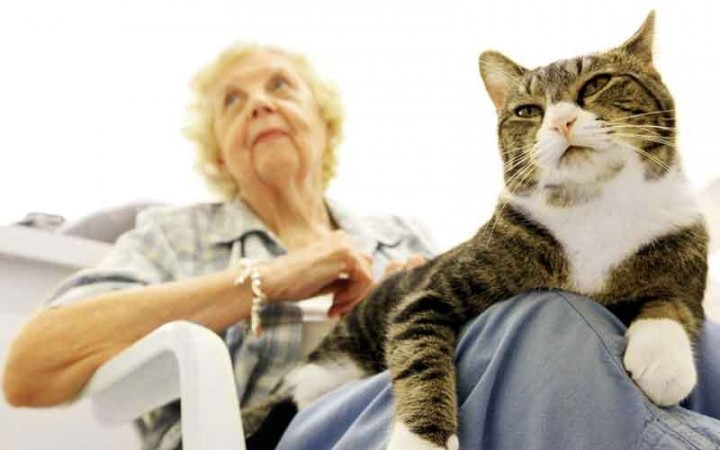
INDIAN RIVER COUNTY — Not every medicine for senior citizens comes in a bottle or out of a syringe. The medicine in some cases comes with four paws and a wagging tail.
For more than a decade, physicians and other experts have pointed out the positive impact that pets have on older Americans.
A study published in the Journal of the American Geriatrics Society in 1999 demonstrated that independently living seniors who have pets tend to be in better physical and mental health than those that don’t.
The study found they were more active, coped better with stress, and enjoyed better overall health. A 1997 study also showed that elderly pet owners had significantly lower blood pressure than people without pets.
Janet Winikoff, education director of the Humane Society of Vero Beach and Indian River County, sees many positive benefits to pets and her agency has a fairly sophisticated process for linking people with pets and following up with support.
“More people are looking for companionship and unconditional love,” says Winikoff. “Some are older people or widows or someone moving here to start a new life and looking to add love to their lives.”
“There is nothing else like a pet to provide that companionship,” she says.
A number of theories have evolved to help explain why pets are good medicine for older people.
At the top is the fact pets need to be walked, fed, played with and petted, all things that require people be involved even if it’s just getting up to let a dog out or brushing a cat.
That helps the cardiovascular system and keeps joints limber and flexible, according to the American Animal Hospital Association.
Consistently performing those types of exercise can keep pet owners able to carry out the normal activities of daily living, the association says.
Pets may also aid seniors simply by providing physical contact.
Studies have shown that when people pet animals, their blood pressure, heart rate, and temperature decrease.
“The greatest benefit is for companionship whether you are eight or 80,” says Winikoff.
That was illustrated by the association study that notes “pets can act as a support system for older people who don’t have any family or close friends nearby.”
The geriatric society study showed that people with pets were better able to remain emotionally stable during crises than those without.
Pets can also work as a buffer against social isolation. Often the elderly have trouble leaving home, so they don’t have a chance to see many people.
Pets let them interact, easing depression that is a common medical problem facing seniors today.
The responsibility of caring for an animal may also give the elderly a sense of purpose, a reason to get up in the morning. Pets also help seniors stick to regular routines such as getting up in the morning, buying groceries, and going outside, which help motivate them to eat and sleep regularly and well.
Winikoff says people – be they elderly or not – can get help picking the right pet at the humane society.
“A lot of people come in and say, “I had a German shepherd as a child” and looking for another German shepherd.”
That’s often not the best approach for a prospective pet owner to take.
“If someone is more reserved, maybe an active animal is not what they are looking for,” she says. “In actuality, people should find the animal that is the best match for you.”
“Match for You” is the society’s program where counselors assess what attributes people are looking for in a pet and try to match them with the right pets.
She says a lot of people come seeking to adopt a pet based on looks or breed.
“We try to stress matching people and personality,” she says. “Matching is a great way to keep people together.”
Winikoff say the pet-matching service is like “E-Harmony for pets and people.”
“We’re like a dating service,” she says. “We focus more on their expectations. We are not trying to be nosey or intrusive. We want to help make a new match.”
Winikoff says many seniors go to the Humane Society and adopt pets.
“We have a lot of seniors who come to the shelter and are delighted,” she says.
Humane Society managers want those matches to work so they also offer programs for people after they’ve adopted.
The goal, Winikoff says is to keep pets and people together.
“We also offer behavior counseling,” she says. “That’s one of the other ways we keep pets in the home.”
A six-week dog training program is offered for $35. If someone gets a pet from the Humane Society and completes the program, their $35 is refunded.
But for some people, having a pet maybe isn’t the best option, says Winikoff. It’s not unusual for older people to spend some time here. We have a wonderful connection with seniors, many of who are volunteers in the thrift shop.
Others just walk around the Humane Society checking out the cats and dogs or visit with them.
The Humane Society also started a new Animal Preventative Health Clinic this month for inexpensive medical care for people’s pets.
“We provide only basic exams, heart worm tests, micro chipping and spaying and neutering,” says Winikoff.
“We are trying to help the animals,” she says. “A number of animals come in here to the shelter and they haven’t seen a vet in years.”
Winikoff noted that animals are turned in because people have money problems or health woes.
The clinic – open Monday-Friday 9 a.m. to 4 p.m. by appointment – is another way the Humane Society hopes to keep people and their pets together.
“We don’t believe this is a substitute for a veterinarian,” Winikoff says. “They should have an established veterinarian. Keep pets and people together. That’s really important to us.”



